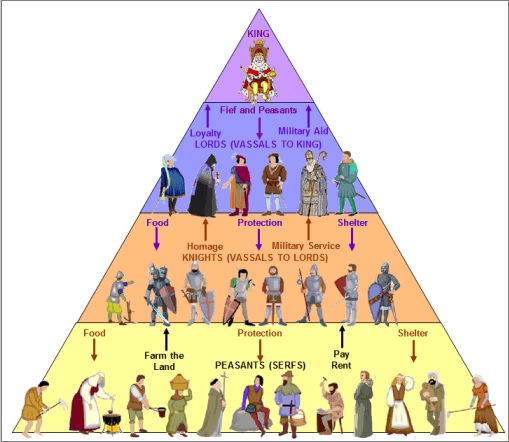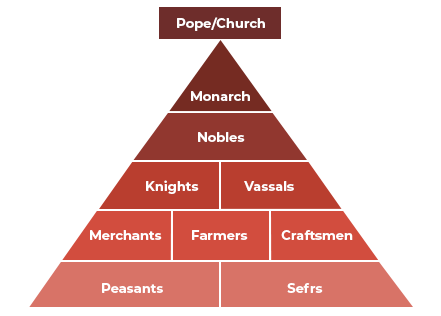Feudalism, Church Rule, Emergence of Merchant Class
by Devender
0 7327
- Medieval Period in Europe was the period from 600 AD to 1500 AD.
Feudalism
Feudalism is derived from the word "feud", which means "conditional ownership of land".
Feudalism developed due to lack of a single central political authority. Due to this, the Western Europe was divided into many small and big kingdoms. In these kingdoms, the local lords became more powerful than the kings and started controlling the society and its affairs.
The main features of that time was:1 Land was the main source of power and not money. The large piece of land you own, the more powerful you are.
2 Lack of central political power, the kings were not powerful enough to control the society and many feudal lords who controlled the affairs of the society.
The peasants used to work on the lands of the Feudal Lord and they were exploited by the same. Whatever produced was consumed by these lords and the inhabitants, only a little was traded.
"Serfdom" was an important part of the feudalism.
- What are Serfs?
- The Feudal Hierarchy
Serfs were the people who used to work on the lands of lords and do all the labour for them as they deemed fit. They were not free to change their lords, in fact they were tied to lands on which they worked, if the land is bought by another lord, then the serfs will work for them. This system was known as serfdom.

The Feudal Hierarchy consisted of the king at the top and all his noblemen below him. Every nobleman was a liege of and only of his overlord.
This system was unbreachable which means a lord will only follow the orders of the lord superior to him and not any other lords further higher than even his lord.
More importantly, no lord was the direct owner of the land under him, he only held the land in the name of his overlord. So, every land was still under king's authority as he was at the top of this chain.
Each lord has its own army and has sole authority of his estate. In simple terms there was no central authority in functionality, the king was central authority in legal terms but he was not able to control everything. All this was resulting in very little political unity.
The Church Rule
Once the rulers in Europe accepted Christianity, the head of the Roman catholic church i.e. the Pope became the head of the Christian world in the western Europe. By the end of the fifth century, the Pope became even more powerful than the king and often forced kings to follow their orders.

In the beginning, the monasteries were institutes of high learning and monks were working to uplift people's life and for the welfare of the poor but soon, corruption entangled the monasteries too which lead to:
- Monasteries charging money for every ritual like removal of sins
- Pope, nuns, bishops etc. became corrupt & lived like princes
- Church made "once in a year" confession of sins to the Father compulsory and the breach of this rule mandated punishment.
- Church owned & amassed huge property
- The Church was the only institution for education in the medieval time but becoming a Monk was the only future prospect this education offered. They taught in Latin which was not understood by the common man.
- Logic, Reason and Science were discouraged.
Churches made people believe more into witches, superstition and magic. Church became violent. It ordered burning of people who opposed its ideas about God, religion and even the physical phenomena. This was done on charges of "Heresy".
Numerous scientific scholars turned into the victims of Church's disciplines when they proposed logical speculations which refuted the standards (like the Earth is Flat, or, the entire universe spins around the Earth), which the Church engendered to commend God. A large number of them were burnt subsequent to being named witches and as moved by evil spirits.
Emergence of Trade, Towns and Cities
In the Seventh century, the change started when Europe came in contact with Arabs & their luxury goods. From 11th century onward, rapid emergence of Towns, Trade and Crafts was noticed.
The peasants started working as craftsmen and the merchants started to settle in these new towns. After sometime, the number off craftsmen started increasing gradually in these towns and they were expanded to cities. These cities came across all the Europe, mainly along the land-based trade routes or around the sea ports.
To adapt up to the interest because of expanded exchange and towns just as specialization in crafts, an adjustment of strategy for creation of merchandise was felt important. The Merchants and experts in towns began to coordinate themselves in Guilds, which were explicit to the goods being created.
- Rise in influence of Merchant Class
The restoration in exchange and development of Towns brought about rise of another class called the Middle Class, including chiefly of Merchants. The towns gradually liberated themselves from Feudal control. They had their own administration, local army and courts.
Individuals were not attached to the land, had opportunity of occupation and could move around openly. The degree of social mobility that these towns offered pulled in labourers from villages too.
The Serfs were free in Towns and they gave the fundamental labour force to the Merchants. The convergence of more workers gave a home-grown market to the products delivered in towns.
In towns, the economy was cash based and land was not the principle wellspring of force. Step by step, the Merchants began affecting the social and financial, yet additionally the political life in towns.
- Transition to Capitalist Economy
A money based monetary framework was presented in towns and life rotated around cash, instead of land. Land was utilized for creation of money crops, which went about as crude material for production of non-farming merchandise and the labourers in towns got instalment in real money.
The benefits, in type of cash, could be reinvested in exchange and industry not at all like the inactive abundance in type of gold and silver. Such abundance or cash was called 'capital'. The towns turned into a focal point of creation rather than the village.
- King Merchant Nexus and the Peasant Revolts
A nexus between King and Merchants created as both wanted power – political and financial. While Kings needed to dispose of reliance on the Lords and wanted less impedance of the Church, the Merchants needed to appreciate opportunity of exchange and societal position, which the money related benefits brought through exchange and business.
During the fourteenth century, there were numerous worker rebels against the Feudal organizations just as the Church. Subsequently, because of every one of these turns of events, the Feudal framework started to decrease, however it totally finished exclusively by eighteenth and nineteenth century.

Share:







Comments
Waiting for your comments